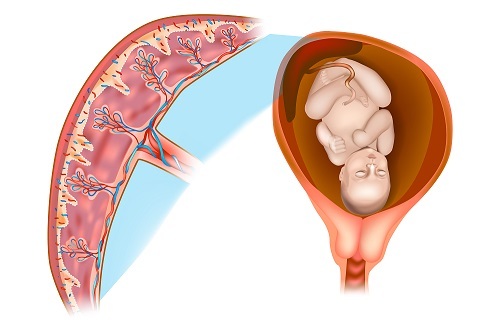
 Data Structure
Data Structure Networking
Networking RDBMS
RDBMS Operating System
Operating System Java
Java MS Excel
MS Excel iOS
iOS HTML
HTML CSS
CSS Android
Android Python
Python C Programming
C Programming C++
C++ C#
C# MongoDB
MongoDB MySQL
MySQL Javascript
Javascript PHP
PHPPhysics
Chemistry
Biology
Mathematics
English
Economics
Psychology
Social Studies
Fashion Studies
Legal Studies
- Selected Reading
- UPSC IAS Exams Notes
- Developer's Best Practices
- Questions and Answers
- Effective Resume Writing
- HR Interview Questions
- Computer Glossary
- Who is Who
What is Placenta and What does it do?
Introduction
The placenta is a unique organ that develops in the uterus during pregnancy and plays a crucial role in the health and development of the fetus. This complex organ forms from the same cells that make up the outer layer of the developing embryo, and it functions to provide oxygen, nutrients, and waste removal for the developing fetus.

Structure
The placenta is a disc-shaped organ that attaches to the inner wall of the uterus and connects to the developing fetus via the umbilical cord. It is composed of both maternal and fetal tissues, with the maternal side being made up of cells from the endometrium (the inner lining of the uterus) and the fetal side being made up of cells from the developing embryo.
Functions
One of the primary functions of the placenta is to exchange gases, nutrients, and waste products between the maternal and fetal circulatory systems. Oxygen and nutrients are transported from the mother's blood supply to the fetus, while waste products and carbon dioxide are transported from the fetus to the mother's blood supply for removal.
In addition to its role in nutrient and waste exchange, the placenta also produces hormones that are essential for pregnancy. These hormones include human chorionic gonadotropin (hCG), which helps to maintain the pregnancy in its early stages, and progesterone, which is crucial for maintaining the integrity of the uterine lining and supporting fetal growth and development.
The placenta also plays a critical role in protecting the developing fetus from harm. It acts as a barrier to prevent harmful substances, such as bacteria, viruses, and toxins, from reaching the fetus. This barrier function is achieved through the selective permeability of the placental membrane, which allows certain substances to pass through while blocking others.
Despite its essential role in pregnancy, the placenta is often overlooked and understudied compared to other organs. However, recent research has shed new light on the complex functions of this remarkable organ and the critical role it plays in fetal development.
One area of research that has received increasing attention is the role of the placenta in fetal programming. Fetal programming refers to the process by which environmental factors, such as maternal nutrition and stress, can influence fetal development and have long-lasting effects on the health of the offspring.
Studies have shown that the placenta plays a critical role in mediating the effects of these environmental factors on fetal development. For example, maternal undernutrition during pregnancy can lead to changes in placental function that result in altered fetal growth and development, as well as an increased risk of chronic diseases later in life.
Similarly, maternal stress during pregnancy can also affect placental function and fetal development. Studies have shown that maternal stress can lead to changes in the expression of genes in the placenta that are involved in regulating fetal growth and development, as well as an increased risk of behavioral and emotional problems in the offspring.
In addition to its role in fetal programming, the placenta has also been implicated in the pathogenesis of several pregnancy complications, such as preeclampsia, fetal growth restriction, and preterm birth. These conditions are thought to arise from disruptions in placental function, which can lead to inadequate nutrient and oxygen delivery to the developing fetus.
Conclusion
Overall, the placenta is a complex and fascinating organ that plays a critical role in fetal development and pregnancy. Despite its importance, there is still much to be learned about the functions of this remarkable organ and the factors that influence its development and function. Ongoing research in this field promises to shed new light on the complex interactions between maternal and fetal physiology and the critical role played by the placenta in shaping the health and well-being of the next generation.
FAQs
Q1. What is fetal programming?
Ans. Fetal programming refers to the process by which environmental factors, such as maternal nutrition and stress, can influence fetal development and have long-lasting effects on the health of the offspring.
Q2. How does the placenta mediate the effects of environmental factors on fetal development?
Ans. Studies have shown that the placenta plays a critical role in mediating the effects of environmental factors on fetal development by altering placental function and gene expression, which can lead to changes in fetal growth and development and an increased risk of chronic diseases later in life.
Q3. What are some pregnancy complications that can arise from disruptions in placental function?
Ans. Pregnancy complications such as preeclampsia, fetal growth restriction, and preterm birth can arise from disruptions in placental function, which can lead to inadequate nutrient and oxygen delivery to the developing fetus.
Q4. Why is the placenta an important area of research?
Ans. The placenta is an important area of research because of its critical role in fetal development and pregnancy. Ongoing research in this field promises to shed new light on the complex interactions between maternal and fetal physiology and the critical role played by the placenta in shaping the health and well-being of the next generation.

